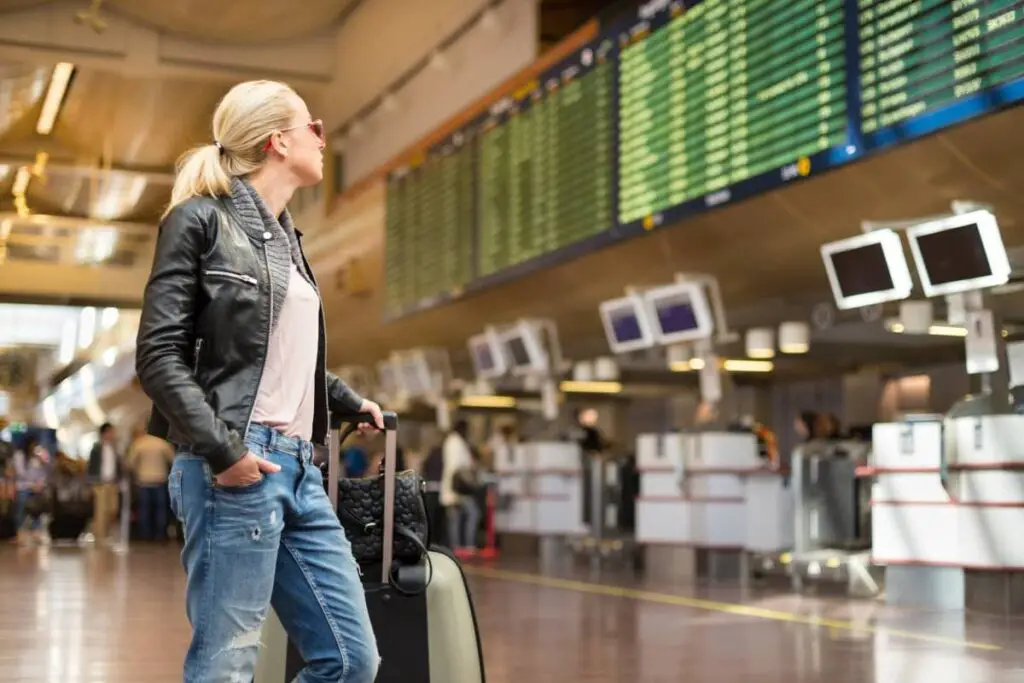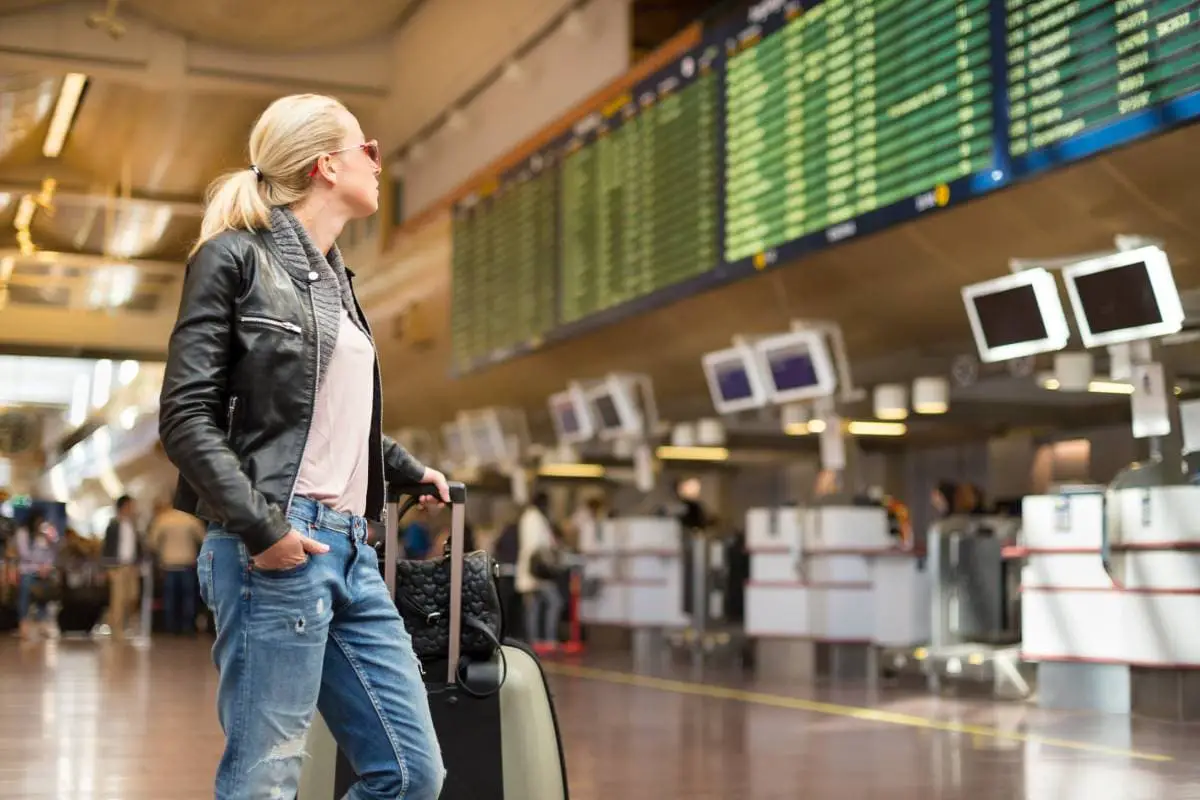Flying with a partner and flying alone are two very different experiences. You must prepare more thoroughly and travel light at the same time. And if it’s your first solo flight, things can get a bit overwhelming.
You can prepare for your first solo flight by learning a lot about the airport you’re flying from. Understand the rules, from max baggage size to security policies, to avoid potential stress, delays, or embarrassments. Train to manage flying anxiety ahead, as there’ll be no one to confide in.
If you plan to fly solo soon, continue reading this article for more insights. I’ll discuss these preparation tips and more to make your flight stress-free.

1. Learn About the Airport of Your Departure
Flying can be pretty nerve-racking for first-timers, especially when you’re alone. Still, many people do it every day without a hitch, so there’s no reason to believe it won’t be the same for you.
In preparation for your first solo flight, familiarize yourself with the airport you’re departing from and its procedures.
For example, owing to the recent COVID-19 pandemic, some airports are strict with wearing facemasks—even during the flight. Others require some proof that you’re at low risk of transmitting it.
Airlines have baggage size and weight limits for domestic and international flights, and security procedures highly vary by airport. There are also some things you can’t take with you on some aircraft.
Missing any of these rules will have consequences that range from minor nuisances to major delays—especially if you have to deal with them by yourself.
There are several ways to know more about your departing airport online:
- Visit its official website. There may be a guide for first-time flyers.
- Look for reviews from past travelers from the airport and learn from their experiences.
- Check the airport’s social media platforms, if available.
If possible, try visiting some days before your departure to get used to the surroundings and talk with a staff member.
Learn about its architecture, moving around, departure terminal, check-in counter, and waiting areas. You can also learn how to track your upcoming flight on the Flight Information Display System (FIDS).
(FIDS).
Finally, if you haven’t flown before, understand general facts about it via the International Civil Aviation Organization’s (ICAO) website .
.
2. Start Packing Your Bag(s) Long Before the Day
It’s easier to make impromptu decisions if you’re flying with a companion. But when traveling alone, it’s best to prepare on time to ensure nothing goes against the plan.
Having to pack your bags the night before the flight can also make you feel stressed and overwhelmed, which is something you want to avoid. You also run the risk of forgetting something.
You’ll have a good head start if you’ve already been to your potential destination. If not, you must know a thing or two about it.
First, understand your landing place’s climatic conditions and allow them to guide your clothing choices. Your shirts down to footwear should respect the area’s weather.
Exchange some money into the currency of the place you’re traveling to before you leave. You can easily do a Google search to check the exchange rate and look for a bank near you.
Don’t forget to plan your food ahead, as you may not like the ones served during the trip.
Some airlines even stopped serving passengers food during the pandemic to limit contact. If this catches you unaware, you may go hungry till the plane’s next stop.
And as you’re planning to beat hunger, prepare your entertainment for the journey. Books, magazines, movies, audiobooks, games, and music are all great ways to make a long flight more fun.
for the journey. Books, magazines, movies, audiobooks, games, and music are all great ways to make a long flight more fun.
3. Learn To Deal With Flight Anxiety By Yourself
Aviophobia or fear of flying affects 33% to 40% of all people, and you’re more likely to fall into the category when going alone.
33% to 40% of all people, and you’re more likely to fall into the category when going alone.
If you think you’re the anxious type from previous flights with friends, or your next solo flight will be your first ever, train beforehand to overcome anxiety. The first, most advisable step is to consult your doctor to discuss it.
Your doctor can provide advice, techniques, and medication to help you relax. If not, consider these tips to beat flight anxiety:
- Arrive early: Leave home three to four hours before departure to ease your stress. You can never tell how busy the airport might be. And if you had to run through travelers encumbered to your boarding gate, praying you aren’t shut out, there are higher chances you’ll experience flight anxiety.
- Learn relaxation techniques: There are multiple ways to begin relaxing when anxiety kicks in, including breathing exercises
 . You can also distract yourself with recorded meditations and repeat optimistic affirmations to yourself. Even chewing gum
. You can also distract yourself with recorded meditations and repeat optimistic affirmations to yourself. Even chewing gum can relieve stress.
can relieve stress.
- Avoid foods that trigger anxiety: Don’t just dig into any appetizing meal you’re served on your solo flight. Some foods can trigger anxiety, including
 cakes, cookies, alcohol, coffee, and processed meats.
cakes, cookies, alcohol, coffee, and processed meats.
4. Jot Down the Essentials
It seems old school to purchase a journal for jotting down information you probably already have on your phone. But here’s my advice: do it anyway.
There are several reasons why you may not be able to rely on your phone during a flight:
- Slow internet connection
- Dead battery
- An unexpected malfunction
- And, in the worst case, losing it
And now isn’t the best time to test your memory retention by cramming anything.
Make sure that all the essential information is in an easily accessible notebook. This info includes:
- Contact numbers: It’s super important to have some family members and friends you can quickly contact whenever anything goes wrong. Keep their phone number(s) safe in your book. Sometimes you can’t be with your phone, especially during immigration.
- Address: If you’re staying in a hotel anytime and have already booked the accommodation, write down their address in a book, paper, or journal. Write the address of a friend’s house if that’s where you’ll be staying.
- Commuting routes: For those who will move around any new city for the first time, writing the steps to catch a train or taxi can come in handy. Learn the distance from such stops to the airport to avoid all sorts of things that could go wrong.
5. Try To Always Keep Your Phone On
Although you shouldn’t solely rely on your phone for the most essential information, prevent it from switching off—primarily from low battery.
One of the easiest ways to ensure this is by keeping a power bank handy. If you don’t already have one, purchase it before your trip.
I recommend the imuto 20000mAh Power Bank on Amazon. It’s large enough to charge your phone multiple times. Moreover, imuto power banks can fit perfectly into your carry-on baggage. It also obeys the ICAO’s safety rule
on Amazon. It’s large enough to charge your phone multiple times. Moreover, imuto power banks can fit perfectly into your carry-on baggage. It also obeys the ICAO’s safety rule that no power bank must exceed 100 Wh (27,000 mAh).
that no power bank must exceed 100 Wh (27,000 mAh).
With your phone always on, you can easily present your digital flight ticket & boarding pass when demanded, make emergency calls more quickly, and easily track your baggage via the airport’s app if such a feature is available.
You may panic when it switches off and you’re not with a friend who can provide one. Adverse outcomes are possibly limitless by then, depending on what you need your phone for.
6. Schedule Your Flight To Land During Daylight Hours
Flying alone is already an uneasy experience for some, but arriving at your destination late can worsen it. Many people who have overlooked this simple preparation step have regretted it, so take it seriously.
Give yourself the luxury of time by landing early, preferably at dawn. You’ll be able to more easily observe and understand the area—especially if it’s foreign. Look for your transport means to locate your lodge, and take a rest.
It’s not easy for many potential first-time flyers to read and understand time schedules well, especially when flying abroad, so you should start learning on time. You’d need to convert your local time to the country’s time you’re heading for a daylight arrival.
Depending on how busy your route is, the airport’s available runways & open gates, and possible construction constraints, departure & arrival times may differ, but they are always specific.
on how busy your route is, the airport’s available runways & open gates, and possible construction constraints, departure & arrival times may differ, but they are always specific.
Search the airport’s schedule for the possibility of a morning arrival at your destination and opt for such tickets.
However, if there’s no ticket for landing in the morning, you can still sleep at the airport till sunrise. You’re alone and shouldn’t put yourself in harm’s way by moving around at night.
7. Check In Early
It is vital to check in before any flight, so try to master the process and do it early.
You can do it online via the airport’s website or app, helping you reduce queue waiting time. At the restricted airside portion of the airport, you’ll present your ticket and the e-boarding pass received as an SMS or email.
On the other hand, previous travelers recommend you check in at the airport if you’re a first-timer or with baggage. Most airports will start around 24 hours before your departure time, so come as early as possible.
Here’s what to expect in many airports’ checking-in counters:
- The officials will scan your international passport or any other ID to ensure authenticity.
- You will get your boarding passes and a baggage claim card.
- Your bag(s) will be weighed and limited if it is a carry-on.
After checking in, you can head to the security checkpoint before moving to the departure gates. You are guaranteed your chosen seat by checking in early.
Early check-in can also prevent anxiety, as it’s an advanced preparation step.
8. Learn To Secure Your Belongings
Being a solo flight, you are the only one responsible for your property, from the bulky baggage to your single-paper tickets and boarding pass. That’s why you should learn to secure them—airports can be crowded, giving snatchers a leeway to operate.
While packing, keep items that you won’t need before or during the flight tucked deep into your bags. Invest in locks, preferably passcode ones, to keep them safe.
The materials you’ll present to board the plane should also be secure but easily accessible. They may include your identification, boarding pass, flight ticket, visa, and vaccination card.
As for backpacks, I recommend the Pacsafe Venturesafe GII Anti Theft Travel Backpack (available on Amazon). Its anti-theft design, from lockable zippers to Radio Frequency Identification (RFID) blocker, will deter pickpockets and keep your cards with smart chips and IDs safe.
(available on Amazon). Its anti-theft design, from lockable zippers to Radio Frequency Identification (RFID) blocker, will deter pickpockets and keep your cards with smart chips and IDs safe.
Also, gravitate to pickpocket-proof clothing when shopping for what to wear on the travel day. Ensure you’re comfortable with your shoes, as you may be required to take them out at the security checkpoint.
Secret compartment clothes are also worth wearing that day to keep your small valuables out of thieves’ sight. Just make sure none of what you’re hiding there is prohibited.
The airport isn’t the only place where you have to keep a close eye on your belongings. I’ve written about protecting your keys and phone when you’re at the beach in another article. Don’t miss it. [How to Keep Keys and Phones Safe When at the Beach Alone]
9. Rest Well Before Your Flight
The night before your first solo flight can be overwhelming, but staying up the night before your departure doesn’t help.
You may get too tired for the flight and need to sleep sometime before or during the journey. If it’s your first time, it’s better to be alert during the entire time you’re inside the airport.
Falling asleep at the airport increases the risk of missing your flight—since you’re alone, no one may wake you. Also, you run the risk of losing your belongings.
Moreover, lack of sleep and anxiety are interlinked with each other. You face the chance of a worsened fear of flight if you don’t rest well.
with each other. You face the chance of a worsened fear of flight if you don’t rest well.
Flying is exhausting, so you shouldn’t already be exhausted before a solo flight.
Final Thoughts
Solo flights aren’t as frightening as you think, but you must prepare well ahead.
Consider these nine tips if you’re going to take one soon:
- Learn about the airport you’re departing from
- Start packing your bags long before your departure
- Learn how to deal with flight anxiety alone
- Write down essential information
- Always keep your phone on
- Schedule your flight to land during the day
- Check in early
- Rest well before the day

